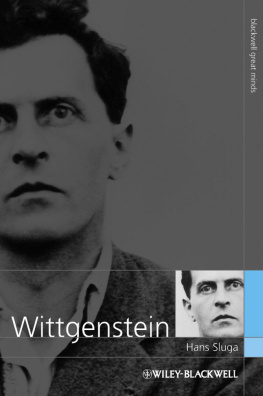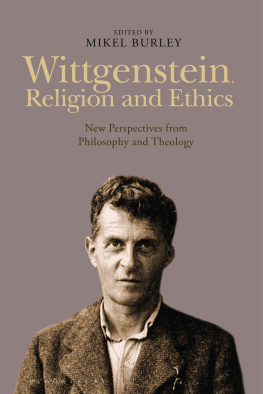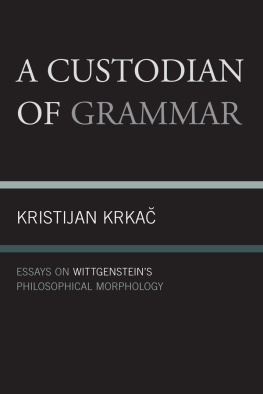Wittgenstein on Thought and Will
This book examines in detail Ludwig Wittgensteins ideas on thought, thinking, will and intention, as those ideas developed over his lifetime. It also puts his ideas into context by a comparison both with preceding thinkers and with subsequent ones. The first chapter gives an account of the historical and philosophical background, discussing such thinkers as Plato, Descartes, Berkeley, Frege and Russell. The final chapter looks at the legacy of, and reactions to, Wittgenstein. These two chapters frame the central three chapters, devoted to Wittgensteins ideas on thought and will. centres on the question What sort of thing is it that thinks or wills?, in particular examining Wittgensteins ideas concerning the first person (I) and concerning statements like I am thinking or I intend to do X.
Roger Teichmann is Lecturer in Philosophy at St Hildas College, University of Oxford, UK.
Wittgensteins Thought and Legacy
Edited by Eugen Fischer, University of East Anglia, UK and Severin Schroeder, University of Reading, UK
1 Wittgenstein on Thought and Will
Roger Teichmann
Wittgenstein on Thought and Will
Roger Teichmann
First published 2015
by Routledge
711 Third Avenue, New York, NY 10017
and by Routledge
2 Park Square, Milton Park, Abingdon, Oxon OX14 4RN
Routledge is an imprint of the Taylor & Francis Group, an informa business
2015 Roger Teichmann
The right of Roger Teichmann to be identified as author of this work has been asserted by him in accordance with sections 77 and 78 of the Copyright, Designs and Patents Act 1988.
All rights reserved. No part of this book may be reprinted or reproduced or utilised in any form or by any electronic, mechanical or other means, now known or hereafter invented, including photocopying and recording, or in any information storage or retrieval system, without permission in writing from the publishers.
Trademark Notice: Product or corporate names may be trademarks or registered trademarks, and are used only for identification and explanation without intent to infringe.
Library of Congress Cataloging-in-Publication Data
Teichmann, Roger, 1963
Wittgenstein on thought and will / Roger Teichmann.
pages cm. (Wittgenstein's thought and legacy)
Includes bibliographical references and index.
1. Wittgenstein, Ludwig, 1889-1951. I. Title.
B3376.W564T39 2015
192dc23
2015000228
ISBN: 978-1-844-65859-6 (hbk)
ISBN: 978-1-315-69214-2 (ebk)
Typeset in Sabon
by Apex CoVantage, LLC
Contents
- BB The Blue and Brown Books , Oxford: Basil Blackwell 1958.
- CV Culture and Value , trans. P. Winch, ed. G. H. von Wright with H. Nyman, Oxford: Basil Blackwell 1980.
- OC On Certainty , trans. D. Paul and G.E.M. Anscombe, ed. G.E.M. Anscombe and G. H. von Wright, Oxford: Basil Blackwell 1969.
- PG Philosophical Grammar , trans. A. Kenny, ed. R. Rhees, Oxford: Basil Blackwell 1974.
- PI Philosophical Investigations , trans. G.E.M. Anscombe, ed. G.E.M. Anscombe and R. Rhees, Oxford: Basil Blackwell 1958 (2nd ed.).
- PO Philosophical Occasions 19121951 , ed. J. C. Klagge and A. Nordmann, Indianapolis, IN: Hackett 1993.
- PR Philosophical Remarks , trans. R. Hargreaves and R. White, ed. R. Rhees, Oxford: Basil Blackwell 1975.
- RPP Remarks on the Philosophy of Psychology (two volumes), trans. G.E.M. Anscombe, ed. G.E.M. Anscombe and G. H. von Wright, Oxford: Basil Blackwell 1980.
- TLP Tractatus Logico-Philosophicus , trans. D. Pears and B. McGuiness, London: Routledge & Kegan Paul 1961.
- Z Zettel , trans. G.E.M. Anscombe, ed. G.E.M. Anscombe and G. H. von Wright, Oxford: Basil Blackwell 1981 (2nd ed.).
Thought and will are two fundamental, and complementary, aspects of the human condition. Our thought strives to represent the world, while through our will we act upon the world. This at any rate is a very compelling picture. As fundamental aspects of the human condition, they have naturally occupied a central place in philosophy for as long as there has been such a thing: as we shall see, Plato was already chewing over questions about thought and will which are entirely familiar from modern discussions.
Not only are thought and will aspects of the human condition, but they are conceptually linked to a host of other phenomena, such as freedom, action, responsibility, truth, knowledge, language, mind and body... in fact, more or less anything of any philosophical clout. The observation that in philosophy everything is connected to everything else only partially softens the force of this remark.
It is not surprising, therefore, that the great Austrian philosopher, Ludwig Wittgenstein, should have written much, and much that is important, on the topics of thought and will. In the Tractatus , the young Wittgenstein mainly concerned himself with thought, his remarks on the will being both brief and as it were pessimistic, in effect denying that we do ever act upon things (see 5051, below). The representational nature of thought he saw as a purely logical matter, i.e. as not having to do with psychological phenomena, nor for that matter with social phenomena, both kinds of phenomena being contingent and empirical in a way that put them beyond philosophical enquiry.
This principled exclusion of the psychological and the social was one of the main things which the later Wittgenstein came to reject: he saw that representation cannot be properly understood abstracted from the empirical phenomenon of human language, and in addition that a complex of psychological or part-psychological notions (understanding, intending, agreeing...) is associated with the representational nature of thought. Moreover, the idea that there is one thing we might call representation is a casualty of his later investigations, so that discussing intention and desire in the same breath as thought becomes (for certain purposes) entirely natural. For if my thoughts have a content, enabling them to be true or false, so do my intentions have a content, enabling them to be fulfilled or not.
, section 2, below.
The above characterization of Wittgensteins thought is very schematic. Flesh will be put on the bones in subsequent chapters. Now anyone who writes on Wittgenstein must be conscious of a rather glaring factnamely, the difference between Wittgensteins own way of presenting his ideas and the more conventional style of exposition and argument likely to be adopted by the writer. This goes for early, middle and late Wittgenstein, contrasting as those periods are; and whilst it is possible, up to a point, to explain the non-discursive style to be found in the notebooks by reminding oneself that these after all contain notes , it is clear that in those texts which he worked at and worked over, he was consciously adopting a mode of expression, and doing so primarily for philosophical (rather than merely stylistic) reasons. It is true that in the preface to the Philosophical Investigations Wittgenstein says that I realized that... the best that I could write would never be more than philosophical remarks, and that this book is really only an album ( PI ix). But the first statement is followed by:
... my thoughts were soon crippled if I tried to force them on in any single direction against their natural inclination.And this was, of course, connected with the very nature of the investigation. For this compels us to travel over a wide field of thought criss-cross in every direction.










